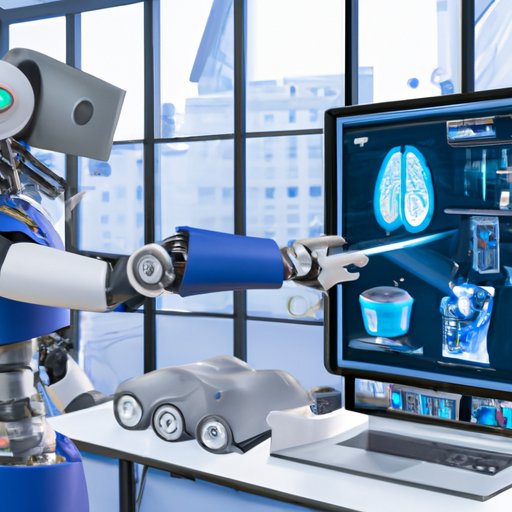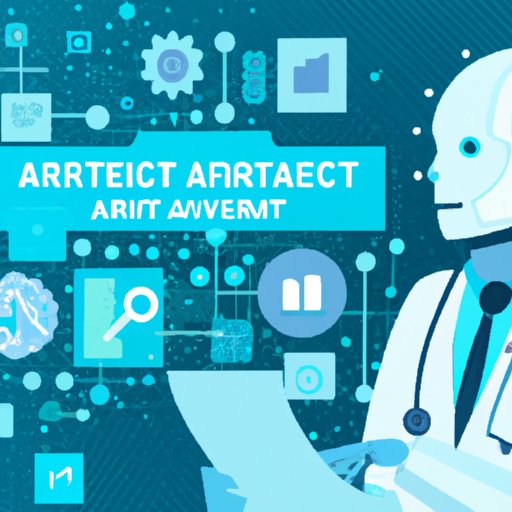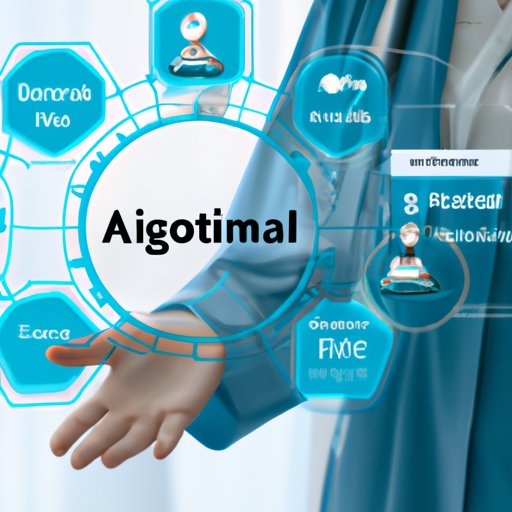Introduction
Artificial intelligence (AI) has long been touted as a revolutionary technology that is transforming various sectors, and healthcare is no exception. AI is being used in hospitals across the world to improve patient care, reduce medical errors, and save lives. In this article, we will explore how hospitals are leveraging AI to achieve these goals and discuss the ethical considerations associated with its use.
Examining How AI is Being Used to Diagnose and Treat Patients More Accurately
The potential for AI to improve the accuracy of diagnoses and treatments is immense. AI-powered diagnostic tools can quickly and accurately identify diseases, even in their early stages, and help doctors make informed decisions about treatments. AI-assisted treatments can help doctors pinpoint the most effective course of action for each individual patient, reducing the risk of misdiagnosis and ineffective treatments.
One example of AI-assisted diagnosis is the use of machine learning algorithms to detect changes in retinal images, which can help diagnose diabetes, glaucoma, and other eye diseases. The algorithm is trained on millions of images of healthy and diseased eyes, enabling it to accurately identify signs of disease in new images. Another example is IBM’s Watson Oncology, a cognitive computing system that helps oncologists make evidence-based decisions about cancer treatments.

Exploring the Potential for AI to Reduce Medical Errors
Medical errors are one of the leading causes of death and injury in the United States. AI can help reduce these errors by providing real-time assistance to doctors and nurses. For example, AI-powered systems can monitor vital signs and alert clinicians if they detect any abnormalities. AI can also be used to prevent medication errors by automatically checking prescriptions and alerting clinicians if there are any discrepancies.
Another way AI is being used to reduce medical errors is through natural language processing (NLP). NLP algorithms can analyze data from electronic health records (EHRs) and provide insights into possible errors. For example, an NLP system might be able to detect inconsistencies between two EHRs and alert the clinician to investigate further. This could help reduce the number of medical errors due to incorrect documentation or data entry.

Showcasing the Use of AI in Robotic Surgery
Robots are being used in hospitals around the world to perform surgical procedures with greater precision and fewer complications than traditional methods. AI-powered robots can be programmed to follow a set of instructions, allowing them to operate more precisely than a human surgeon. AI can also be used to analyze pre-operative imaging data and plan the best surgical approach for each patient.
Robotic surgery is becoming increasingly popular in hospitals, particularly for minimally invasive procedures. According to a recent study, robotic surgery reduces the risk of complications by 30%, and the average hospital stay is reduced by two days. This means that patients can recover quicker and return to their normal activities sooner.

Analyzing the Impact of AI on Healthcare Costs
AI is also being used to reduce healthcare costs. AI-powered systems can automate mundane tasks such as scheduling appointments, ordering tests, and managing billing, freeing up staff time for more important tasks. AI can also be used to analyze data from EHRs and identify opportunities for cost savings, such as unnecessary tests or duplicate orders.
In addition, AI can be used to optimize the supply chain, reducing the cost of medical supplies. For example, some hospitals are using AI to predict demand for certain supplies, enabling them to order only what is needed and avoid costly overstocking. AI can also be used to monitor inventory in real time, ensuring that supplies are always available when needed.
Demonstrating How AI is Helping Physicians Make Faster, More Informed Decisions
AI is also being used to help physicians make faster, more informed decisions. AI-powered systems can analyze large amounts of data in seconds, helping doctors quickly identify patterns and trends that may not be apparent to the human eye. For example, AI can be used to identify correlations between symptoms and diseases, helping doctors diagnose conditions more quickly.
AI can also be used to provide personalized recommendations to physicians. For example, AI-powered systems can analyze a patient’s medical history and suggest the most suitable treatment plans. This can help doctors make more informed decisions and provide better care to their patients.
Investigating the Use of AI in Personalized Medicine
Personalized medicine is a rapidly growing field that uses AI to tailor treatments to individual patients. AI-powered systems can analyze a patient’s genetic data and lifestyle information to develop personalized treatments that are tailored to their specific needs. For example, AI can be used to identify the most effective medications and dosages for a particular patient, reducing the risk of side effects and improving outcomes.
Personalized medicine is also being used to develop targeted therapies for cancer, autoimmune diseases, and other conditions. AI-powered systems can analyze a patient’s tumor sample and identify mutations that can be targeted with drugs, helping to reduce the risk of relapse and improve overall survival rates.
Evaluating the Ethical Considerations Surrounding the Use of AI in Healthcare
Although AI has the potential to revolutionize healthcare, its use comes with a variety of ethical considerations. For example, AI-powered systems can create bias if they are trained on datasets that are incomplete or contain inaccurate information. This can lead to inaccurate diagnoses and treatments, which can have serious consequences for patients.
It is also important to consider the privacy implications of AI in healthcare. AI-powered systems can collect and store vast amounts of patient data, which could be vulnerable to security breaches. To ensure patient privacy and safety, hospitals should implement strict guidelines for the use of AI in healthcare.
Conclusion
AI is being used in hospitals around the world to improve patient care, reduce medical errors, and save lives. AI-powered systems can accurately diagnose and treat patients, reduce medical errors, facilitate robotic surgery, reduce healthcare costs, and help physicians make faster, more informed decisions. AI is also being used to develop personalized treatments for cancer and other conditions. However, its use comes with a variety of ethical considerations, and hospitals must implement strict guidelines to ensure patient privacy and safety.
(Note: Is this article not meeting your expectations? Do you have knowledge or insights to share? Unlock new opportunities and expand your reach by joining our authors team. Click Registration to join us and share your expertise with our readers.)
